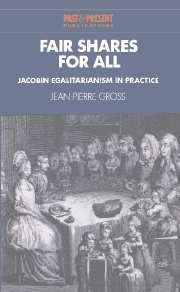Book contents
- Frontmatter
- Contents
- List of tables
- Acknowledgements
- The revolutionary calendar
- List of abbreviations
- Introduction
- 1 The Jacobin mainstream and the Robespierrist ascendancy
- 2 The family ethos and the common happiness
- 3 Food rationing, collectivism and the market economy
- 4 Land tenure, shelter and the right of ownership
- 5 Progressive taxation and the fair distribution of wealth
- 6 Jobs for all and to each a fair deal
- 7 A place at school and a time for rejoicing
- Conclusion
- Bibliography
- Index
- Past and Present Publications
7 - A place at school and a time for rejoicing
Published online by Cambridge University Press: 22 September 2009
- Frontmatter
- Contents
- List of tables
- Acknowledgements
- The revolutionary calendar
- List of abbreviations
- Introduction
- 1 The Jacobin mainstream and the Robespierrist ascendancy
- 2 The family ethos and the common happiness
- 3 Food rationing, collectivism and the market economy
- 4 Land tenure, shelter and the right of ownership
- 5 Progressive taxation and the fair distribution of wealth
- 6 Jobs for all and to each a fair deal
- 7 A place at school and a time for rejoicing
- Conclusion
- Bibliography
- Index
- Past and Present Publications
Summary
Lycurgus claimed that children belonged not individually to their fathers, but to the state.
Lycurgus established meals at which all the citizens ate together a common fare ordained by law … The most exquisite of all their dishes was the one they called the black broth.
André Dacier, ‘Lycurgue’, in Plutarch's Lives, 1721Learning was a basic requirement common to all men. The ‘bread of reason’, as Danton called it, was a vital commodity to be distributed to every child in the family, and which the Montagnards in their Declaration of Rights vowed to ‘put within the reach of all citizens’. It was, in the words of Condorcet, a collective debt which ‘society owes equally to all its members’. Understood as a fundamental human and social right, it followed that its provision should be made by the state free of charge: ‘Equal rights would have been consecrated in vain’, wrote Roux-Fazillac, ‘if all the citizens without distinction were not able to acquire the same knowledge.’ But it was also understood to be an individual obligation and hence compulsory in nature: Lakanal ruled that those deprived families who did not bother to send their children to school would not be entitled to welfare payments.
- Type
- Chapter
- Information
- Fair Shares for AllJacobin Egalitarianism in Practice, pp. 179 - 199Publisher: Cambridge University PressPrint publication year: 1996

